Science Co-Production and the Cohort Experience: Lessons from an NRWD Fellow

When I first started graduate school at UCLA, I believed that the most important part of an academic career is the science. In academia, it’s very easy to get pigeonholed in your research and focus on publishing large impact papers. However, currently, even great scientific insights aren't having an impact in societal and governmental decisions. But what is the reason? Is it the intimidating jargon found in most scientific articles? Or is it because of a lack of focus on outreach? These questions intrigued me, and I decided to work on finding some answers.
I began looking for ways to see how science was being implemented into decision-making contexts. I saw success stories of well-established tenured professors and scientists working with governments at the state and federal level, but how did they get there? I began to worry that perhaps the ability to make a change was not for early-career scientists, like myself.
I must not have been the only one noticing this gap, because in the past year alone, I've seen a huge increase in calls for grants, fellowships and proposals to fund graduate students in actionable science research and policy engagement. This is especially true for the environmental sciences. One of these fellowships was being provided by the Southwest Climate Adaptation Science Center (SW CASC) for the 2019-2020 academic year. The Natural Resources Workforce Development (NRWD) Fellowship provides one student each from 7 consortium universities the opportunity to collaborate together on use-inspired and actionable science to inform natural resource management decisions. I was lucky enough to be one of the recipients of this fellowship, and in our short period of time together, I have already begun to see the incredible benefits.
I cannot emphasize enough the importance of teamwork in collaborative efforts. At the beginning of the fellowship, our cohort was flown to Utah State University (USU) for training in translational ecology and interdisciplinary collaboration. The process was intensive and jam-packed with lessons, and we even got to engage in role-playing activities. This was one of my favorite parts. At the end of the meeting we all got together and started working on our project. At this point, we knew each other well enough to have trust in our ability to accomplish the task at hand. I thank the SW CASC and the crew at USU for this, because it was due to their excellent planning efforts.
The cohort members were strategically picked due to their expertise and connections with stakeholders in their respective field. My research is focused on environmental change in coastal salt marshes, while others are focused on hydrological dynamics of river systems and mining influences on ecosystem changes, for example. This provides us the opportunity to interact and collaborate with researchers from a diverse set of backgrounds, and provides a key set of expertise to address our science theme for this year: improved understanding of the linkages between the management of headwater ecosystems and downstream water resources. There is a strength in having scientists from different university backgrounds come together with a specific purpose, as each individual brings with them their breadth of knowledge and resources from their department and community. This exposure is invaluable and has fostered unique and impactful attitudes and ideas for science communication.
We are still early on in the process (the fellowship year is October 2019 – September 2020), with only a handful of meetings under our belts, but I believe that we are going to create a meaningful project that will serve communities outside of our own. I also believe that, because of this experience, we are creating long-lasting relationships, and learning important skills, that will carry on throughout our scientific careers. Perhaps, many years from now when we are all well-established, we can look back fondly at this experience as a career milestone.

